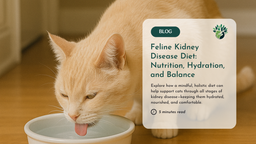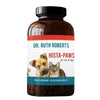Autoimmune disease in dogs and cats can resemble allergies, but they require different treatments. If your pet is always itching, licking, or having skin problems, it might have allergies in cats or an autoimmune disease in dogs. Allergies happen when the body reacts to things like pollen or certain foods. Since they have different causes, they need different treatments.
This guide will help you understand the differences, identify triggers, and find the best way to help your pet.
What Are Pet Allergies?
An allergy happens when a pet’s immune system reacts too strongly to something that is usually harmless—like food, pollen, dust, or flea bites. Instead of ignoring these things, the immune system treats them like a dangerous enemy and tries to fight them off. This can cause itchy skin, tummy problems, or ear infections in cats with allergies or dogs with sensitivities.
The immune system’s job is to protect the body from germs and sickness. But sometimes, it makes a mistake and attacks things that are not actually harmful. According to a study in AVMA, there are two main ways the immune system can react to allergens:
- Quick Reaction (IgE Response) – The body reacts fast and causes itching, swelling, or redness when the pet eats or touches something they are allergic to.
-
Slow Reaction (Cell Response) – The immune system attacks over time, leading to ongoing skin issues and inflammation.
What Are Autoimmune Diseases in Dogs and Cats?
The immune system helps protect the body from germs like bacteria and viruses. But sometimes, it gets confused and attacks the body's own healthy cells by mistake. This is called an autoimmune disease. Some pets, like cats, may have autoimmune diseases in dogs and cats without showing any signs, while others, like dogs, might suddenly develop symptoms due to triggers such as vaccines, flea treatments, or household chemicals.
3 Common Autoimmune Diseases in Dogs and Cats
- Lupus (Systemic Lupus Erythematosus - SLE): This disease makes the immune system attack different organs. Pets with lupus may have joint pain, skin problems, and kidney issues.
- Immune-Mediated Polyarthritis (IMPA): This condition causes swollen and painful joints, making it hard for pets to walk or move.
- Pillow Foot (Plasma Cell Pododermatitis): Affects cats by making their paw pads swollen, soft, and sore. In some cases, the pads may crack or bleed, causing pain.
How Are Allergies and Autoimmune Diseases Connected?
Allergies and autoimmune diseases happen when the immune system becomes too active. To manage these conditions effectively, it is important to keep the immune system balanced. Some autoimmune diseases can be more complicated and may need extra treatments. However, a basic step is to focus on gut health.
About 70% of the immune system is found in the gut, so maintaining a healthy gut is vital for keeping the immune system balanced and preventing it from overreacting. Healthy diet plays a key role in this balance.
4 Natural Solutions for Pet Autoimmune Diseases and Allergies
To manage autoimmune diseases in dogs and cats, focus on strengthening the immune system, reducing inflammation, and eliminating triggers for effective healing.
1. Rotation & Elimination Diet
A rotation and elimination diet helps identify food sensitivities that worsen skin issues in dogs and cat skin issues.
A homemade diet like The Original CrockPet Diet helps maintain balanced nutrition. Opt for a plain human multivitamin to avoid potential allergens in pet supplements.
How to Implement:
-
List foods your pet has eaten in the last six months.
-
Divide them into three meal plans with different proteins, vegetables, and carbohydrates.
-
Rotate every few weeks and monitor symptoms.
-
Use the same ingredients for treats to prevent contamination.
2. Probiotics for Gut Health
Since most immune system chemicals are made in the gut, probiotics help restore gut balance and provide relief from allergic reactions.
How to Use Probiotics:
-
Start with a high-dose probiotic daily for 40 days.
-
Slowly reduce the dosage but keep taking the supplements regularly to your pets.
3. Omega-3 Fatty Acids for Inflammation
Omega-3s can reduce skin irritation and autoimmune reactions. Omega-3s help regulate the immune system, preventing overactive responses that can trigger autoimmune diseases and inflammation.
Here are the best sources:
-
Algal or calamari oil (for fish-sensitive pets).
-
Avoid Omega-6, as it can increase inflammation.
4. Allergy & Sensitivity Testing
Testing identifies food and environmental triggers for skin autoimmune diseases in cats and dogs, helping to develop a clear treatment plan. Consulting a veterinarian ensures an accurate diagnosis and targeted solutions.
Conclusion
Understanding the link between autoimmune diseases in dogs or cats, and allergies in cats or dogs is essential for proper management. By addressing gut health, reducing inflammation, and eliminating triggers, you can help your pet live a healthier, itch-free life. For more expert insights on natural pet allergy relief, check out Dr. Ruth Roberts' discussion with Dr. Jeff Grognet.
















